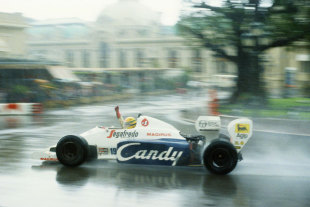- June 3 down the years
Senna and Bellof robbed of grandstand finish
What happened on this day in Formula One history?
- Drivers:
- Erwin Bauer
- |
- Stefan Bellof
- |
- Peter Collins
- |
- Juan Manuel Fangio
- |
- Graham Hill
- |
- James Hunt
- |
- Bruce McLaren
- |
- Alain Prost
- |
- Ayrton Senna
- |
- Jackie Stewart
1984
Just 31 laps of the Monaco street circuit were enough to mark the emergence of two of the most exciting talents in Formula One. Ayrton Senna and Stefan Bellof made names for themselves as they closed on McLaren's Alain Prost for the lead of the race and outperformed their cars in terrible weather conditions. Nigel Mansell had taken the lead from Prost early on but crashed heavily five laps later when the rain intensified. When second-place Niki Lauda also crashed the road was clear for Senna to close on Prost, and he did so at a remarkable rate. His Toleman slid from corner to corner taking chunks of time out of Prost on each lap, but, to the amazement of onlookers, it was quickly turning into a three-way race as Bellof - who had started last on the grid - closed on both of them. The rain continued to come down and on each lap Prost gesticulated wildly to the race director Jacky Ickx to stop the event. To his relief the red flag was eventually shown at the end of lap 31, leaving Senna and Bellof infuriated. What might have happened if the race had been allowed to continue is still a hotly debated topic in F1.
1956
Transmission failure robbed Juan Manuel Fangio of near certain victory at Spa Francorchamps and handed the win to his Ferrari team-mate Peter Collins. Fangio had been the class of the field all weekend but in the wet conditions got too much wheelspin from pole position and dropped back to fifth as Moss took the lead. Over the next five laps Fangio came storming through the field and quickly resumed his position at the front of the field. As the track dried Moss struggled to keep up with the Ferrari and then lost a wheel at Eau Rouge, sending his car spinning off the circuit at high speed. Fortunately he didn't hit anything and, in a remarkable display of bravery, jogged back to the nearby pits and took over the car of his team-mate Cesare Perdisa. It looked as though Fangio had the race wrapped up, leading from his Ferrari team-mates Collins and Paul Frere but after two thirds race distance he had to pull over with gearbox problems. Collins assumed the lead and the win ahead of Frere, while Moss worked his way back up to third place to split his points with Perdisa.
1973
Jackie Stewart won the Monaco Grand Prix, taking the 25th victory of his career and equalling the record held by Jim Clark. He took advantage of Ronnie Peterson's reliability issues to win the race ahead of Emerson Fittipaldi while Peterson recovered to third. It was also James Hunt's world championship debut and he burst onto the F1 scene with a drive from 18th to sixth that was only halted by the failure of the Cosworth engine in his Hesketh-entered March.
1962
Graham Hill had to wait another year to take the first of his five eventual Monaco Grands Prix victories, after being forced into retirement from a 48 second lead in the 1962 event. In the end Bruce McLaren came through to take his third career win, having spent most of the race in a distant second. Jim Clark had been the pre-race favourite but got caught up in Willy Mairesse's accident at the first corner and fell back down the field. Meanwhile, Hill had come out on top in a battle for the lead with McLaren, and was going about extending his advantage at a considerable rate. But while the gap grew over McLaren, Clark gradually closed on Hill and once he moved up to second he quickly reeled in the BRM. But just as Clark looked set to take the lead he dropped back with a clutch problem and was eventually forced to retire. This reinstated Hill with a massive lead over McLaren but he also succumbed to reliability problems and eventually retired with just seven laps remaining.
1958
German privateer Erwin Bauer died racing a Ferrari sports car at the Nurburgring. Tragically the accident happened after the chequered flag but Bauer hadn't realised the race was over and had his accident on what should have been a slowing down lap. He came to prominence racing an unfancied Lotus to fourth at the Nurburgring 1000km in 1954, which was a fantastic result in one of the first racing cars built by the legendary marque. His only F1 race was in a privately-entered Veritas, also at the Nurburgring, but he lasted just over a lap before his engine expired.

